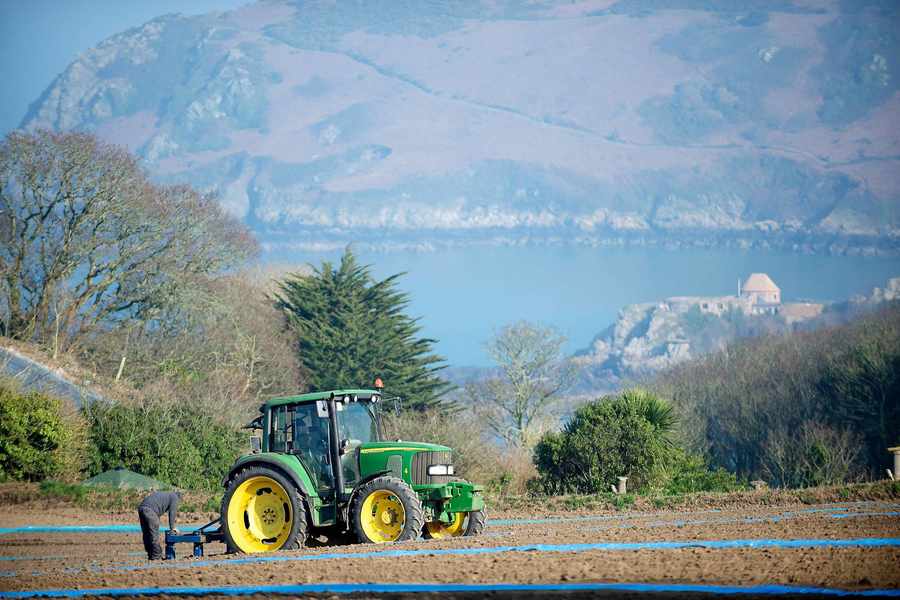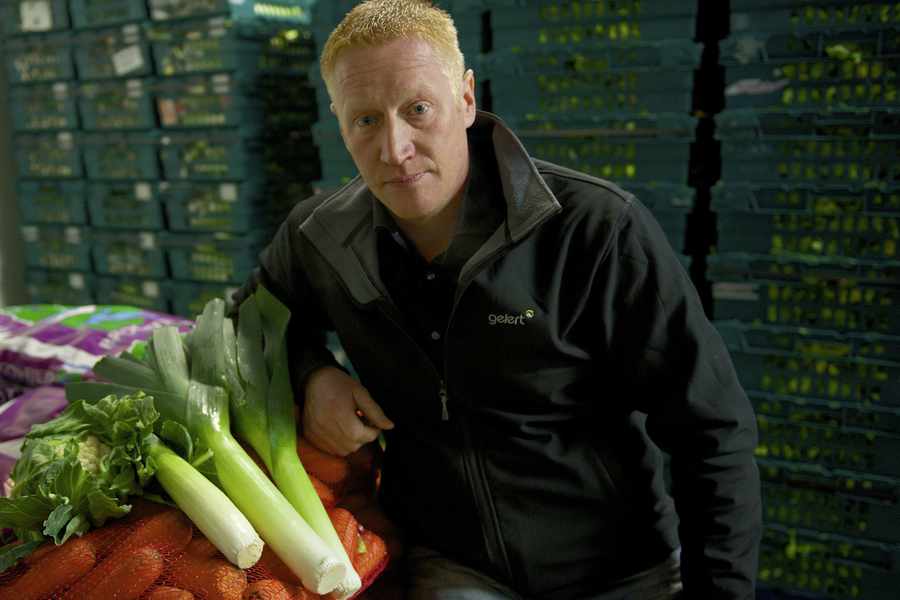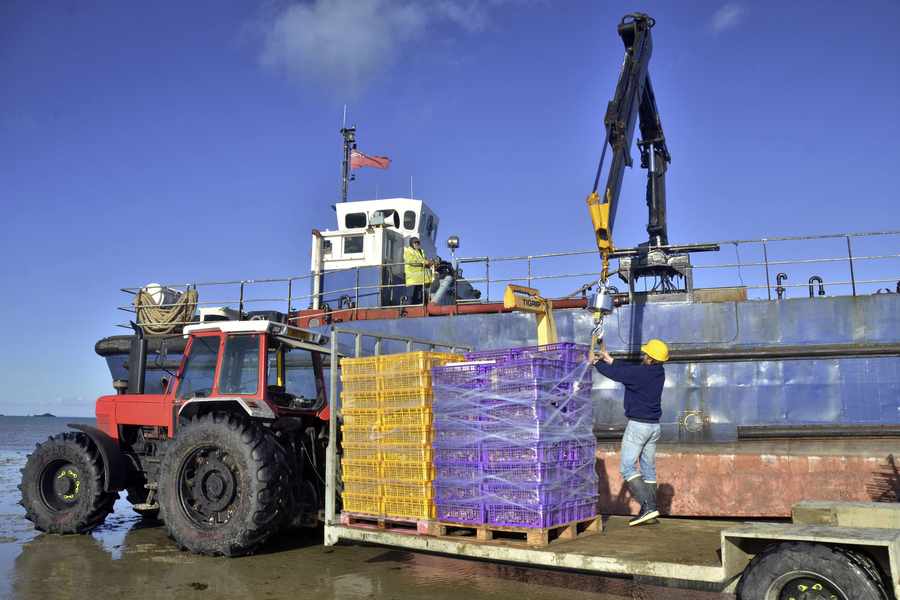Hours after Amal-Grow – the Channel Islands’ largest vegetable producer – confirmed it is to close in July, Charlie Gallichan of Woodside Farms in Trinity said States backing is essential if his plan to keep supermarkets, shops and restaurants stocked with local produce is to succeed.
With millions spent promoting finance every year, and following the £105,000 States bail-out of the Island’s fishing fleet last year when they were severely hampered by storms, he says now is the time for action.
Neither Mr Gallichan or politicians would confirm the amount they are asking for, but if financial support is not forthcoming they say local food production will be hit.
‘We have asked the States for support and we are waiting for further discussions. We are hoping to get the level of support we need but the scale of any future operation will depend on the level of support from the States.
‘If they can support us we can go for the all-inclusive supply partnership with other growers.’
Graham Le Lay – the president of the Jersey Farmers Union (JFU), which has more than 90 members, a third of whom are producers, is urging the States to give as much support as it can to the agricultural industry.
‘We would be delighted if Charlie took over Amal-Grow as it is imperative that local produce is available on the shelves. They have to support the industry a lot more than they have been doing to keep it going. All agriculture in Jersey is on a knife edge,’ he said.

Whatever happens, Woodside Farms wants to acquire Amal-Grow, but the size of the operation and how many other growers become involved, hangs on the amount of support ministers agree once Economic Development, Treasury, Environment, Jersey Business and the States Adviser, have considered Mr Gallichan’s proposal.
He is backed by a group of growers, the JFU and the Environment Minister, Deputy Steve Luce, who is keen to support further diversification in agriculture and other sectors of the economy.
‘I have been working with all the parties to try to find alternative access to the local market for local growers,’ said the Deputy. ‘I am also hugely supportive of diversification on the coast and in local farming, including organic and dairy and all local growing is important.’
While growers wait to hear if their livelihoods and roles as custodians of the countryside are to be protected, the Island’s oyster farmers are celebrating being the first in the world to receive global accreditation for their responsible management and commercial practices in one of the most bio-diverse marine landscapes in the British Isles.
Having worked together, the three business that farm oysters in the Ramsar site in the Royal Bay of Grouville, Jersey Oyster Company, Jersey Sea Farms and Seymour Oyster Company, have been accredited by the Aquaculture Stewardship Council, the international organisation that manages the global standards for responsible and sustainable sea farming.
Farmer presses on with rescue bid for growers

TRINITY farmer Charlie Gallichan is pressing ahead with his rescue bid to secure supplies of fresh local vegetables after the Channel Islands largest producer confirmed they are ceasing trading on 3 July.
However, the success of his business plan depends on how much the States are willing to pay to secure local production and protect the livelihoods of those who work in the agricultural industry.
Amal-Grow announced last month it would close in the summer, putting 49 jobs at risk, blaming its decision on high production costs, wages and land rents.
‘We have asked the States for support and we are waiting for further discussions,’ said Mr Gallichan, who runs Woodside Farms.
‘We’re hoping to get the level of support we need but the scale of any future operation will depend on the level of support from the States. If they can support us we can go for the all inclusive supply partnership with other growers. Until we know what we are getting from the States it is difficult to include all the other growers.’
Following talks with members of the Jersey Farmers Union, a group of growers agreed to back Mr Gallichan’s plans and it is hoped others will join them, opening up the industry to further diversification into niche crops.
In the meantime, Woodside Farms is working with the owners of Amal-Grow, UK producer Albert Bartlett, to finalise the deal and to ensure a smooth transition for customers, which include the islands’ major retailers, the Channel Islands Co-operative Society, Waitrose and SandpiperCI.
If growers are to meet the Channel Islands’ need for fresh veg over the winter, planting must begin soon.
A recommendation would be made to ministers in the immediate future, he added.
Environment Minister Steve Luce said: ‘Ever since the break of the Amal-Grow story I have been working as hard as I can with all the producers to try to find an alternative access to the local market for local growers.
‘I am hugely supportive of diversification in the countryside.’
Woodside Farms is the second largest producer in Jersey supplying the local market as well as exporting daffodils to America and Europe. Mr Gallichan is the fifth generation to head the family business.

JERSEY’S oyster farmers are the first in the world to be recognised by an international organisation that sets global standards for responsible and sustainable aquaculture production.
Jersey Oyster Company, Jersey Sea Farms and Seymour Oysters joined forces to make the first application for accreditation from the Aquaculture Stewardship Council (ASC) which manages the global standards for responsible and sustainable aquaculture, or sea farming.
Jersey Oyster’s owner, Chris Le Masurier, who is the third generation of his family to farm oysters and mussels in the Royal Bay of Grouville, hopes it will open new markets for the already thriving local industry.
‘It is nice to be the first,’ he said. ‘It’s been a long process because we were the first in the world to receive accreditation, which is really good for Jersey. I am confident that we’ve opened their eyes to aquaculture in Jersey and set the standard quite high.
The three local businesses were assessed last year by examiners against the ASC Bivalve Standard and they had to demonstrate that they were responsible employers, farmed according to best practice and could guarantee the provenance and traceabilty of their products.
The inspectors also consulted other local stakeholders including the Environment Department and beach users. The processes they applied will set the standard for future applications.
Environment Minister Steve Luce welcomed the news, saying it was a real boost for the Island’s ‘blue economy’ – fishing and aquaculture – which he wants to expand and encourage young Islanders to work in.
‘It has great opportunities for youngsters or new business ventures in the industry in the future and I am looking at ways to change policy to help that as aquaculture is proving to be a profitable industry,’ he said.
The Jersey Oyster Company was the first to receive their accreditation certificate, however, the other two producers will get theirs before the industry takes part in an international seafood trade show in Belgium next month.
The company is the largest oyster farm in the British Isles, farming some 35 hectares in Grouville Bay, exporting over 700 tons of oysters a year with 80% being exported to France.
Mr Le Masurier will be promoting the Island’s new premier status at Seafood Expo Global which is expected to attract more than 25,000 members of the global seafood industry.
‘The main thing will be to market our products as Jersey oysters. Although 80% of our export market goes to France it is not obvious that the oysters come from Jersey. What we want to do now is to be proud of our product and package it as a Jersey product and show that we are farming responsibly,’ he said.
In the 19th century Jersey was one of Europe’s main oyster producers with an estimated two billion oysters exported to English markets between 1810 and 1871.
Over-fishing destroyed the industry until the 1970s when aquaculture returned to the bay, led by Mr Le Masurier’s grandfather.






